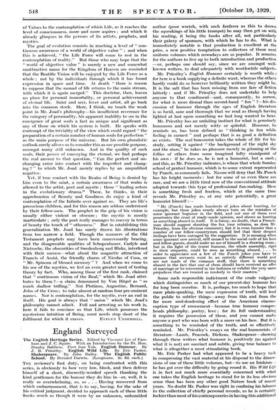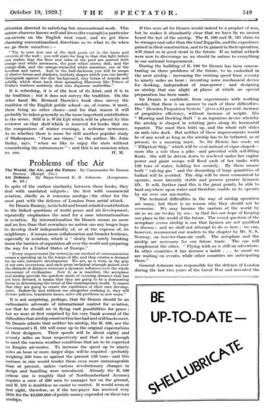England Surveyed
The English Heritage Series. Edited by Viscount Lee of Fare-
. ham and J. C. Squire. With an Introduction by the Rt. Hon. Stanley Baldwin. First four Vols. English Humour. By J. B. Priestley. English Wild Life. By Eric Parker. Shakespeare. By John Bailey. The English Public School. By Bernard Darwin. (Longmans. 3s. Oct. each.) THE reviewer's first duty, on being confronted with this series, is obviously to bow very low, blush, and then deliver
himself of a short, discreetly-Worded speech thanking the kind gentlemen for the honour they do him in—er, well, it is really so overwhelming, so, so . . . Having recovered from which embarrassment, that is to say, having, for the sake of his critical judgment, decided to approach each of these little -books much as though it were by an unknown, unheralded
author (poor wretch, with such fanfares as this to drown the squeakings of his little trumpet) he may then get on with
his reading, it being the books after all, not particularly their galaxy of sponsors, with which he has to do. What is immediately notable is that production is excellent at the price, a new positive temptation to collectors of those neat uniform volumes which nowadays are so popular. It remains for the authors to live up to both introduction and production —or, perhaps one should say, since we are amongst well- known writers, to deal adequately with worthwhile subjects.
Mr. Priestley's English Humour certainly is worth while : for here is a book supplying a definite want, whereas the others
hardly could do so however brilliantly written they might be. It is :the salt that has been missing from our fare of fiction
latterly : and if Mr. Priestley does not undertake to help anyone to that candimeni—and, consequently, to sorrow, for what is more dismal than second-hand " fun " ?—his dis- cussion of humour through the ages of English literature is so lucid, sane and thorough that we read as .though having
lighted at last upon something we had long wanted to hear. Mr. Priestley has an unfailing instinct for what is genuinely humorous and not merely witty or spiteful. Humour, he reminds us, has been defined as " thinking in fun while feeling in earnest " and perhaps that is as good a definition as exists. The real humourist takes the whole of life for his study, setting it against " the background of the night sky and the stars," he takes no pleasure merely in grinning at the follies of others from some imagined lofty standpoint of his own : if he does so, he is not a humorist, but a snob ; and this, as Mr. Priestley indicates, is Where that whole Sunday school of genteel humour, which is to some extent represented by Punch, so commonly fails. No one will deny that Mr. Punch has his bright moments : but for some of us even ihese are rare, and we are a little tired now of the conventional attitude adopted towards this type of professional fun-making. Here is something fresh and fearless, which at the same time reveals Mr. Priestley as, at any rate potentially, a great humorist himself
" He (Punch) has made hundreds of jokes 'about hunting, for example, but these jokes nearly always turn on the mistakes of some ignorant beginner in the field, and not one of them ever .penetrates ;the crust of ready-made opinion, and shows us hunting as something absurd in itself. It is funny, no doubt, that a French- man should suggest shooting the fox (one refrains, as does Mr. Priestley, from the obvious comment), but it is even funnier that a number of our fellow-countrymen should feel that their deepest feelings have been outraged by the suggestion. It is amusing when some ignorant new arrival, still unused to the social code of his host and fellow-guests, should make an ass of himself in a drawing room : but in the light of the truest humour, the whole assembly, rigid in their etiquette, could be seen as something absurd. . . . In order to appreciate not a few of the Punch jokes you have to assume that servants exist in an entirely different world and are not made of the common stuff, that there is something absurd in the fact that one of them should have received an offer of marriage or be interested in the fashions or exhibit the very same prejudices, that are treated so tenderly in their masters."
Some such responsible indictment of the crude vulgarity which distinguishes so much of our present-day' humour has for long been overdue. It is, perhaps, too much to hope that mere plain-speaking, the mere expression of truth, will lead the public to subtler things—away from this and from the far more soul-deadening effect of the American cinema- caption type of amusement—because true humour compre- hends philosophy, poetry, love ; for its full understanding it requires the possession of these, and you cannot make anyone a poet who was born with a sneer on his face. But it is something to be reminded of the truth, and so effectively reminded. Mr. Priestley's essays on the real humourists of literature—Lamb, Peacock, Dickens, Shakespeare—showing through these writers what humour is, positively (as against
what it is not) are succinct and subtle, giving-true-balance to
what is altogether a most stimulating book.
Mr. Eric Parker had what appeared to be a heavy task in compressing the vast material at his disposal to the dimen- sions of one of these little volumes, but—to use an Irishism– -
he has got over the difficulty by going round it. His Wild Life is in fact not much more essentially concerned with what one takes the English heritage to stand for in its less obvious
sense than has been any other good Nature book of recent years. No doubt Mr. Parker was right in confining his labours to the collection of chiefly personal records; as he is certainly luckier than most of his contemporaries in having this additional attention directed to satisfying but unsensational work. This nature observer knows well and loves (for example) a particular sea-cavern on the English west coast, and we get these charming conventionalized directions as to what to do when we go there ourselves :—
" Try to peer into one of the dirk pools set in the basin and crevices of the wall : you will stare for long in that dim light before you realize that the floor and sides of the pool are starred with orange and white anemones, the pure white snowy disk, and the orange-disk, and the orange-tentacled white anemone, one of the loveliest and rarest. And in the half-darkness you will be aware of elusive forms and shadows, feathery shapes which you can hardly distinguish against the dim background, tiny forms of serpula and sabella, which draw back their spreading filaments like Prince of Wales's feathers suddenly shut into Japanese umbrellas."
It is refreshing, it is of the best of its kind, and it is in the tradition ; but it does not survey the tradition. On the other hand Mr. Bernard Darwin's book does survey the tradition of the English public school—as, of course, it must, there being no other choice—and for that reason it will probably be taken generally as the more important contribution to the series. Still it is Wild Life which will be placed by this reviewer on that shelf which is reserved for books that are the companions of winter evenings, a welcome newcomer. As to whether there is room for still another popular study of Shakespeare, " there are times," as the author, Mr. John Bailey, says, " when we like to enjoy the stars without remembering the astronomers " : and this is an occasion when























































 Previous page
Previous page